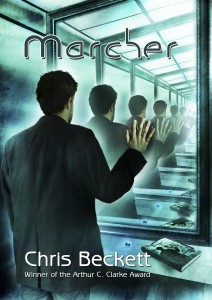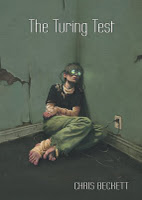Published in Postscripts anthology #19, ‘Enemy of the Good’, edited by Peter Crowther and Nick Gevers, 2009.
(Collected in The Peacock Cloak from Newcon Press)
Blog, books, stories.
Published in Postscripts anthology #19, ‘Enemy of the Good’, edited by Peter Crowther and Nick Gevers, 2009.
(Collected in The Peacock Cloak from Newcon Press)
Published in Interzone, March-April 2010. (The issue also includes a guest editorial by the author, which comments on the story.)
(Collected in The Peacock Cloak from Newcon Press)
Published in Asimov’s, April-May 2009.
“Everyone wears bugeye goggles to interact with the virtual world while shutting out most of the real one. Everyone but Richard, who is not “normal.” Richard sees too many things that aren’t really there for everyone else, like Electric Man and Steel Man. He doesn’t need technology to make him see even more delusions.
Emerging from the burger bar, Richard too confronted the drizzle and the electric lights: orange, white, green, red, blue. But while Jenny had taken the everyday scene for granted, for him, as ever, it posed an endless regress of troubling questions. What was rain? What were cars? What was electricity? What was this strange thing called space that existed in between one object and the next? What was air? What did those lights mean, what did they really mean as they shifted from green to amber to red and back again, over and over again?
Richard thinks that one day he may be the only person who ever sees the world as it is, and that perhaps, if no one sees it any longer, it may cease to exist. To see atomic truths, you need to have atomic eyes.
A fascinating and humane look through a pair of different eyes, with hints from Bishop Berkeley.” – Lois Tilton, The Internet Review of Science Fiction
(Collected in The Peacock Cloak from Newcon Press)
 Charles Bowen is an immigration officer with a difference: the migrants he deals with don’t come from other countries but from other universes. Known as shifters, they materialize from parallel timelines, bringing with them a mysterious drug called slip which breaks down the boundary between what is and what might have been, and offers the desperate and the dispossessed the tantalizing possibility of escape.
Charles Bowen is an immigration officer with a difference: the migrants he deals with don’t come from other countries but from other universes. Known as shifters, they materialize from parallel timelines, bringing with them a mysterious drug called slip which breaks down the boundary between what is and what might have been, and offers the desperate and the dispossessed the tantalizing possibility of escape.
Growing out of short stories such as ‘Tammy Pendant’, ‘To Become a Warrior’ and ‘The Welfare Man’, Marcher was originally published in the US under the Cosmos imprint. It is now available in a new and extensively revised edition, as of August 2014 from Newcon Press. (More details here.)
“One of the best SF novels of the year” (Colin Harvey, Suite 101, reviewing the original Cosmos edition of Marcher)
Published in Interzone, October 2008.
(Collected in The Peacock Cloak from Newcon Press)
Published in Interzone, October 2008.
(Collected in The Peacock Cloak from Newcon Press)
 A collection of 14 short stories. WINNER OF THE EDGE HILL SHORT FICTION AWARD 2009, and the Edge Hill Readers’ Prize.
A collection of 14 short stories. WINNER OF THE EDGE HILL SHORT FICTION AWARD 2009, and the Edge Hill Readers’ Prize.
NB: Though Elastic Press is no longer in business, this book is STILL IN PRINT. It is also available on Kindle.
Comments from James Walton, Chair of Edge Hill panel of judges:
‘I suspect Chris Beckett winning the Edge Hill Prize will be seen as a surprise in the world of books. In fact, though, it was also a bit of surprise to the judges, none of whom knew they were science fiction fans beforehand. Yet, once the judging process started, it soon became clear that The Turing Test was the book that we’d all been impressed by, and enjoyed, the most – and one by one we admitted it.
‘This was a very strong shortlist, including one Booker Prize winner in Anne Enright, and two authors who’ve been Booker shortlisted in Ali Smith and Shena Mackay. Even so, it was Beckett who seemed to us to have written the most imaginative and endlessly inventive stories, fizzing with ideas and complete with strong characters and big contemporary themes. We also appreciated the sheer zest of his story-telling and the obvious pleasure he had taken in creating his fiction.’
The Turing Test at Hive UK/Waterstones /Amazon UK / Amazon US
Published in Interzone, September-October 2006; 2nd place in annual Interzone reader’s poll.
(This story is collected in The Turing Test from Elastic Press)
“I’ll admit that Chris Beckett’s “Karel’s Prayer” was the one I was really itching to read, and so I left it till last, just like the Yorkshire puddings with my Sunday roast. Ah, sweet deferment of gratification – it was well worth the wait. The clever layering and deep themes are a hallmark of Beckett at his best – mixed in with the clash of science and religion are questions of identity, of knowing who and what one is. Dovetailing with current events in the news, there is torture and sneaky governments enacting backstage shenanigans in the name of national security. The very ambiguity of right and wrong is the pivot for the whole thing – comparative morality portrayed with all the warts and scars. It would be a shame to spoil this one for a reader, so you’ll just have to take my word for it – this is a brilliant story. At the risk of veering into hyperbole, Beckett may run the risk of becoming (thematically, at least) Britain’s Philip K. Dick – I say ‘risk’ only because that’s one hell of a benchmark to set for anyone. I hope he lives up to it – minus the descent into religious paranoia and insanity, of course.” – Paul Graham Raven, Velcro City Tourist Board
Published in Asimov’s, March 2006.
The back story to the novel.
(This story is collected in The Turing Test from Elastic Press)